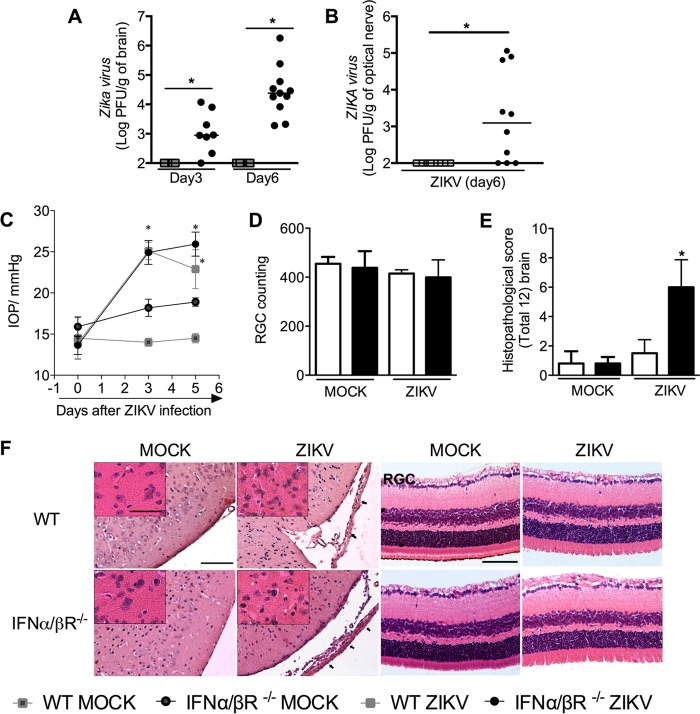N-Methyl-d-Aspartate (NMDA) Receptor Blockade Prevents Neuronal Death Induced by Zika Virus Infection
Zika virus (ZIKV) infection is a global health emergency that causes significant neurodegeneration. Neurodegenerative processes may be exacerbated by N -methyl-d-aspartate receptor (NMDAR)-dependent neuronal excitoxicity. Here, we have exploited the hypothesis that ZIKV-induced neurodegeneration can be rescued by blocking NMDA overstimulation with memantine. Our results show that ZIKV actively replicates in primary neurons and that virus replication is directly associated with massive neuronal cell death. Interestingly, treatment with memantine or other NMDAR blockers, including dizocilpine (MK-801), agmatine sulfate, or ifenprodil, prevents neuronal death without interfering with the ability of ZIKV to replicate in these cells. Moreover, in vivo experiments demonstrate that therapeutic memantine treatment prevents the increase of intraocular pressure (IOP) induced by infection and massively reduces neurodegeneration and microgliosis in the brain of infected mice. Our results indicate that the blockade of NMDARs by memantine provides potent neuroprotective effects against ZIKV-induced neuronal damage, suggesting it could be a viable treatment for patients at risk for ZIKV infection-induced neurodegeneration. IMPORTANCE Zika virus (ZIKV) infection is a global health emergency associated with serious neurological complications, including microcephaly and Guillain-Barré syndrome. Infection of experimental animals with ZIKV causes significant neuronal damage and microgliosis. Treatment with drugs that block NMDARs prevented neuronal damage both in vitro and in vivo These results suggest that overactivation of NMDARs contributes significantly to the neuronal damage induced by ZIKV infection, and this is amenable to inhibition by drug treatment.
Authors
Vivian V Costa; Juliana L Del Sarto; Rebeca F Rocha; Flavia R Silva; Juliana G Doria; Isabella G Olmo; Rafael E Marques; Celso M Queiroz-Junior; Giselle Foureaux; Julia Maria S Araújo; Allysson Cramer; Ana Luíza C V Real; Lucas S Ribeiro; Silvia I Sardi; Anderson J Ferreira; Fabiana S Machado; Antônio C de Oliveira; Antônio L Teixeira; Helder I Nakaya; Danielle G Souza; Fabiola M Ribeiro; Mauro M Teixeira
External link
Publication Year
Publication Journal
Associeted Project
Microbiology or Immunology
Lista de serviços
-
RASL11A, member of a novel small monomeric GTPase gene family, is down-regulated in prostate tumors.RASL11A, member of a novel small monomeric GTPase gene family, is down-regulated in prostate tumors.
-
Splice variants of TLE family genes and up-regulation of a TLE3 isoform in prostate tumors.Splice variants of TLE family genes and up-regulation of a TLE3 isoform in prostate tumors.
-
Concepts on Microarray Design for Genome and Transcriptome AnalysesConcepts on Microarray Design for Genome and Transcriptome Analyses
-
The iron stimulon of Xylella fastidiosa includes genes for type IV pilus and colicin V-like bacteriocins.The iron stimulon of Xylella fastidiosa includes genes for type IV pilus and colicin V-like bacteriocins.
-
Origins of the Xylella fastidiosa prophage-like regions and their impact in genome differentiation.Origins of the Xylella fastidiosa prophage-like regions and their impact in genome differentiation.
-
The role of prophage in plant-pathogenic bacteria.The role of prophage in plant-pathogenic bacteria.
-
Genetic control of immune response and susceptibility to infectious diseases.Genetic control of immune response and susceptibility to infectious diseases.
-
Building capacity for advances in tuberculosis research; proceedings of the third RePORT international meeting.Building capacity for advances in tuberculosis research; proceedings of the third RePORT international meeting.
-
São Paulo School of Advanced Sciences on Vaccines: an overview.São Paulo School of Advanced Sciences on Vaccines: an overview.
-
A reasonable request for true data sharing.A reasonable request for true data sharing.

